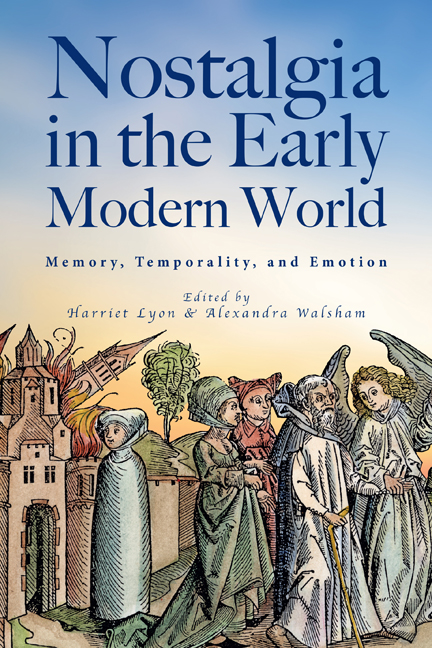9 - Sung Farewells: Listening for Nostalgia’s Futures in the Long Fifteenth Century
Published online by Cambridge University Press: 11 January 2024
Summary
Nostalgia is always about time and place. Our memories, our desires, and our attachments are about places in time, and times in places. In this chapter I compare two famous songs from the fifteenth and early sixteenth centuries to uncover their convergent and divergent varieties of nostalgia: Guillaume Du Fay's Adieu ces bons vins de Lannoys (‘Farewell, you fine wines of Laon’) and Heinrich Isaac's Innsbruck, ich muss dich lassen (‘Innsbruck, I must leave you’). Each song forms a chronotope, a time-space made by leaving a particular place at a particular time. In each song the chronotopic nostalgia is iterative, a process repeatedly performed and imagined in literal and virtual journeys in space and time. The future plays a critical role in constructing nostalgia in these short works, becoming a space for playing out, constructing and inhabiting nostalgic memories – memories placed in the future, as it were. But this play of time and memory is further complicated by these future memories being located in the present in the performance of the song. The chapter argues that this blurring of time, so characteristic of nostalgia, is also intimately related to its affective qualities as a mixed feeling.
Dedicated literature on nostalgia and music in the fifteenth century is sparse to non-existent. Indeed the scholarship on music and emotion more generally in the period has been limited, and where present has focused in more detail on music theory and sacred settings. Within the disciplines most engaged in current discussion of premodern nostalgia, literary scholars and historians have turned in most detail to the study of the sixteenth century, the site of the emergence of a variety of nostalgias, particularly for the medieval past. Formed by the emergence of the study of medievalism and its blurred temporalities, and increasingly shaped by the dangers of resurgent right-wing racist nostalgias, scholars of the Middle Ages have turned to examine in detail varieties of medievalist nostalgias in global contexts. Somewhere in the middle, the cultural production of ‘multiple, layered’ fifteenth- and early sixteenth-century desires for lost times and places, with all their problems and potentials, remains to be heard with care across their multiple sites of cultural production. This chapter hopes to prompt us to listen again for varieties and inflections of nostalgia in the song repertoire of the period.
- Type
- Chapter
- Information
- Nostalgia in the Early Modern WorldMemory, Temporality, and Emotion, pp. 209 - 227Publisher: Boydell & BrewerPrint publication year: 2023



